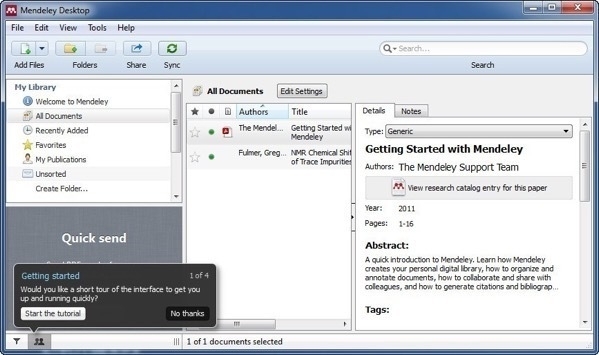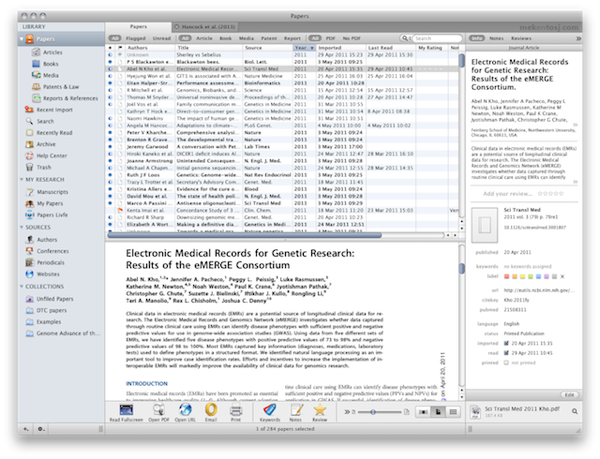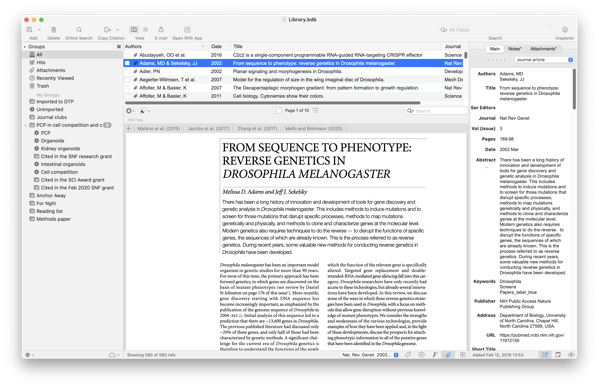I did my first real lab work back in 2010. I joined Ernst Wimmer’s lab in Germany during my Erasmus Scholarship and for the first time, I was exposed to proper lab work, lab notebooks, reading articles within a project, and scientific writing, including citing vast amounts of reference material. Before that, I had some projects during my degree where I had to reference scientific articles. However, with a small subset of references, I didn’t need any manager to help me put together all of my references. That changed when I wrote my Diploma thesis and had to gather dozens of articles, from which I cited somewhere between 30 and 50 in my thesis. I needed some computer help. And I stumbled upon my first reference manager. My weapon of choice then was Mendeley. It was free, a simple browser extension, and could handle a large library. It was perfect for a poor student like me and it was new and shiny (and I love new and shiny, that is one of my flaws). I used it and tried to convince everyone willing to listen about how good it was. Compared to the big ol' contenders, specially EndNote, it was simple. But that simplicity was its strength for someone like me, which had no money to pay for such an expensive solution and also needed something that could just digest a bunch of articles and give me a list of references for my thesis.

The romance continued for a few years until I started my Ph.D. By then, Mendeley had changed. The “free” wasn’t really free anymore. Mendeley had switched to a freemium plan. It had set a limit to how many articles I could put in there and I knew my scientific library was going to grow a lot during my research. Also, and that might be a story for another day, was bought by Elsevier, and it was part of Elsevier’s set of “solutions” for scientists. One day I might be brave enough to share my thoughts regarding big publishers and their role in enshittifying science. But let’s get back to my harmless journey. So I spent some time to see my options, and as a relatively new Mac user, I went for a native option that had a strong foundation on MacOS. I found Papers, by Mekentosj. It was perfect.

You’ll find my next comments baffling if you visit their current website. I’ll get to that. When I started using it, Papers 2 was a native app, with a one-time payment, a local library with unlimited references, a PDF reader, annotation tools, EndNote-style referencing and the cherry on top was its beautiful user interface. Shortly after I started using it they released Papers 3.0 and it was even better looking. Among other things, it improved syncing with iPhone and iPad (I love reading articles on my iPad), and it modernized the UI to match the new Apple design guidelines. I thought I found my partner for life. But of course, as with most good things, it had to come to an end.
<img style=“display:block; margin-left:auto; margin-right:auto;” src=“https://cdn.uploads.micro.blog/107137/2023/fc50c316ec.png" alt=“Screenshot of Papers “Readcube” after Springer relaunched it.” title=“Screenshot_of_Papers3.png” border=“0” width=“600” height=“327” />
Papers was bought by Springer Nature, the second giant competing with Elsevier. It was the same story all over. They promised support for Papers 3, but their plan was to integrate the system into their in-house solution to reference management: ReadCube. If you try to find Papers now, everything is part of ReadCube. And that’s what you see if you go to the Papers website. Of course, I checked their approach with ReadCube, but it wasn’t for me. And by then I was already quite fed up with big publishers controlling also which tool I use for my references, so despite liking some of ReadCube’s ideas, I wasn’t going to get on board with it. And as expected, support for the traditional Papers 3 app was getting worse and worse. I knew the days of Papers were counted and by the end of my Ph.D. I had to look once again for an alternative. At this point, it was a bit more tricky, as my whole library was on Papers and I had a half-written Ph.D. thesis and two manuscripts on the making. As the references were handled by Papers, I feared changing software at this point was going to be a hassle that I didn’t have the time to deal with while still doing some experiments, writing the thesis, and having back-and-forth manuscript drafts with my supervisor. So I reluctantly kept working with Papers until my Ph.D. thesis and articles were published and then I looked for an alternative.
I remember that other scientists were also looking for alternatives during the Papers debacle. Some landed on Zotero’s land, an excellent open-source option. I tried it and even though it was good, it wasn’t for me. I like having the PDFs of my references in my reference manager, and Zotero limits your library to 300 Mb unless you pay for extra storage. If you just need a place to store your references and to help you build reference lists for your manuscripts, it is great. But I wanted/needed something different. I got used to the extensive toolset of Papers and I needed a powerful, yet affordable alternative that could sync my whole library and let me read my PDFs on my iPad. I ended up discovering Bookends. The app has a long history, although I never considered it before. In terms of looks, it was a step back from Papers. Bookends definitely has an “old school Mac” feel to it. It looks cluttered, and it is quite overwhelming the first time you open it. But this also means it has many options. It imported my whole Papers library without a problem. It also lets you keep references and PDFs together and syncs with my iPad. All in all, it had everything I needed. It has many more tools worth mentioning, and someday I will do a more in-depth review of it. It is still (after 5 years) the reference manager I use and recommend, but suffice it to say, it is powerful, reliable, and blazing-fast, which are three things I must have in my reference manager.

So here you have it. After over a decade, I’ve tried almost every option out there and for now, I’ve settled on Bookends. Now I hope SonnySoft keeps developing for a long time and they don’t end up engulfed by one of the big names in an attempt to get me on board with them. That, I will never do (I hope this sentence never comes back to bite my ass).